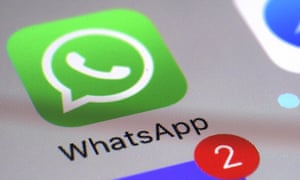
The article is about the situation Whatsapp is in for breaching the user content and privacy with Facebook, which had breaches into EU law.
- “a clear, comprehensive resolution” in compliense to EU law- European Union’s data regulator group
- Facebook was fined £94m in May for providing misleading information about its 2014 takeover of WhatsApp.
- “Over the last year we have engaged with data protection authorities to explain how our 2016 terms and privacy policy update apply to people who use WhatsApp in Europe. We remain committed to respecting applicable law and will continue to work collaboratively with officials in Europe to address their questions.”- Whatsapp spokesmen
- WP29 action comes ahead of new, more powerful European laws called the General Data Protection Regulation, which will give regulators the power to fine companies up to 4% of global turnover.
- “The efforts of WhatsApp and Facebook to resolve the issues have not yet addressed our concerns. We remain committed to leading a European-level response to these concerns, which affect millions of users in the UK and across the EU.” - UKs information Commissioner
WhatsApp, is used by more than one billion people daily, had changed it privacy policy last year sharing users' phone numbers and other information with Facebook. This change in their policy creates a regulatory scrutiny across Europe including the UK.
The European Union’s data regulator group is focusing on Whatsapp for sharing user content and data with it's parent company Facebook. The task force, which is lead by the UK's information commissioner office, has been made by the 'pan- European data regulator', the Article 29 Wokrinf Party (WP29). The Facebook company was issued a first issued warning for its chat app for sharing user data with wider groups whiting the Facebook company, forcing them to holt its data transfer for the chat app.
The European Union’s data regulator group is focusing on Whatsapp for sharing user content and data with it's parent company Facebook. The task force, which is lead by the UK's information commissioner office, has been made by the 'pan- European data regulator', the Article 29 Wokrinf Party (WP29). The Facebook company was issued a first issued warning for its chat app for sharing user data with wider groups whiting the Facebook company, forcing them to holt its data transfer for the chat app.
The focus was for the requirement for users to give their consent to the sharing of their data and the level of information provided for them to make an informed choice from the app.
The regulators picked apart the WhatsApp legal basis for consent and noted that the information given to its users about privacy policy update was “seriously deficient as a means to inform their consent”. The apps group gave a non concerned "take it or leave it approach" stating users who disliked should stop using the app all together, which the regulators found did not constitute freely given consent. While, those who agreed nonchalantly or such things as pre-ticked boxes also constitute as unambiguous consent .
Facebook has been under a lot of scrutinity for its breach of its audiences privacy by sharing personal information among its own smaller companies but among even political powers such as my last article of Facebook sharing personal data from users to Trumps promoting group. I think this is another case where institutions are making it seems they are catering to their audiences but rather they themselves hold a lot of power in what they want is to be exposed to and which groups in countries, towns, age should be shown particular information.
For me, peopel are witnessing a lot this year on data sharing in apps, privacy etc. From apps and how they aren't all as private as we thought. This is another reflection on targeting certain audiences with specific information such as Trumps administration knowingly targeting people who they knew would vote for them from information given by ut Facebook.
New technology allows these groups to make all these micro changes in their policies or updates which would go unproved to most but will have an extremely effect in what we consume daily from news to chatting apps, certainly, showing the amount of power they posses among their audiences.
No comments:
Post a Comment